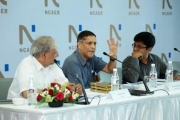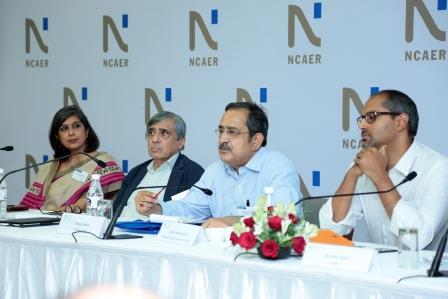NCAER held the 14th India Policy Forum at the India International Centre in New Delhi on July 11-12, 2017. The IPF is NCAER’s annual economic policy research conference that brings together academics, policymakers, industry representatives, media, and researchers for discussions on key issues of Indian economic policy. The IPF includes presentations of original commissioned papers, leading to a published volume, and the annual IPF Lecture. A distinguished international Advisory Panel and an international Research Panel guide the IPF. The annual IPF Volume is the highest ranked economic journal out of India based on citation counts.
The keynote address at IPF 2017 was delivered by Arvind Subramanian, Chief Economic Advisor, Government of India. Complimenting NCAER on its efforts over the years to promote applied policy research across India’s many economic development challenges, Dr Subramanian highlighted the need for “relevance, rigour, and timeliness” in policy research. He said that in his work as the CEA, he had found how policymakers simply do not have the luxury of waiting for the perfect answer, but nonetheless wanted experience and accumulated wisdom on what works and does not work in economic policy. “It is great to be here among this wonderful audience and an interesting array of papers and topics for the IPF’s presentations,” commented Subramanian, while releasing the 13th IPF 2016-17 volume.
Shekhar Shah, Director General of NCAER and co-editor of the IPF Volume, said that he “welcomed both the advice that the CEA had for researchers and his suggestion to provide an expert resource that government economists could turn to for ready reference and quick queries on policy and technical issues of data and methodology.” He added, “NCAER would be more than happy to explore a ‘help-line’ resource of the kind that Subramanian had recommended.”
Karthik Muralidharan, Associate Professor at the University of California, San Diego, and co-editor of the IPF volume, said that “Academics do need different time frames to ensure that their answers are correct, but that is exactly the gap that we try to bridge with the India Policy Forum. Increasingly, the IPF features papers that draw upon a mountain of high quality research and produce definitive assessments of the best policy advice. These policy assessments can be invaluable go-to resources for policymakers in a hurry.”
Subramanian’s address was followed by presentations of five papers on the solvable challenge of air pollution in India; a deep dive into state budgets in India; India’s linkages into global value chains; the implementation of ICT in agriculture; and the drivers of growth of India’s cities and towns in the 2000s.
In addition to Subramanian, several sessions of the IPF were chaired by key policymakers, including S. P. Singh Parihar, Chairman of the Central Pollution Control Board, Anup Wadhawan, Additional Secretary, Ministry of Commerce and Industry, and Ramesh Chand, Member of NITI Aayog. B. J. Panda, Member of the Lok Sabha, participated in a final panel discussion on market failure versus government failure in India.
The 14th IPF included a Policy Roundtable on financial inclusion and household finance in India, with the Panel debating the difficulties on the supply and demand side of household finance that need to be overcome in order to promote much greater financial inclusion of the relatively large percentage of the population that remained outside the formal financial system.
The IPF 2017 ended in the evening of 12th July with the Annual IPL Lecture delivered by Professor Lant Pritchett of the Harvard Kennedy School at the Imperial Hotel. Pritchett’s IPF Lecture on “Avoiding the morning-after blues: Building state capability while times are good,” combined different strands of his work on why countries should use periods of high growth to the fullest to build the capabilities of the state. His work along with Lawrence Summers had shown that such periods do not persist indefinitely. Countries therefore need to focus their energies and resources on realistic pathways to build state capacity during the “good times”.









































